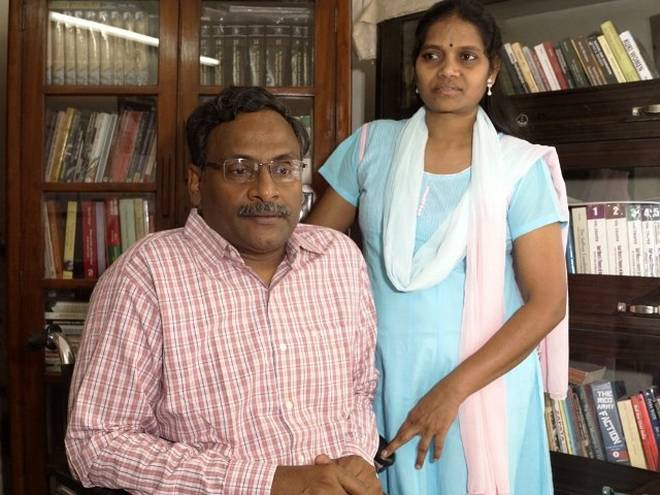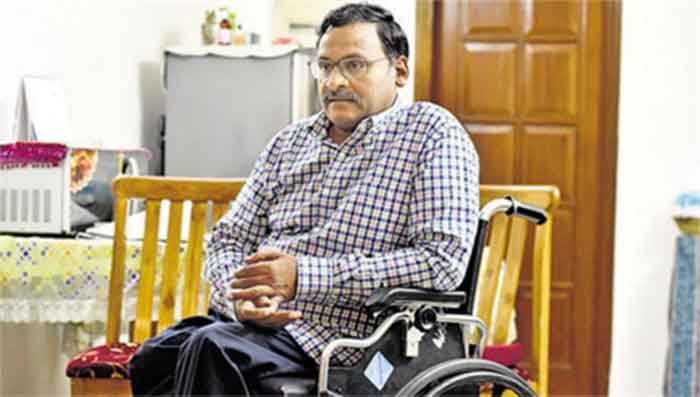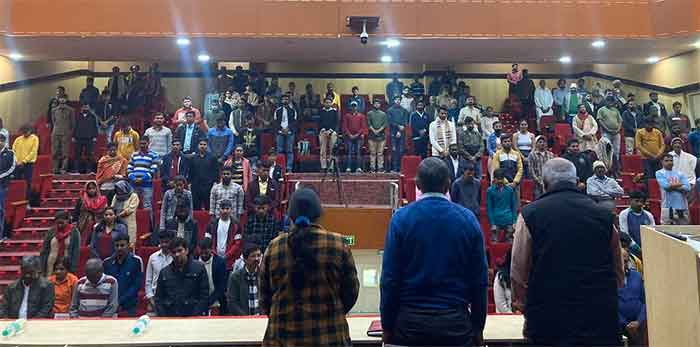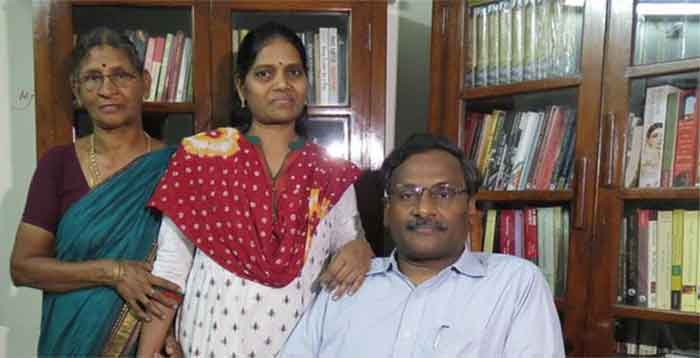
To,
Honourable Justice H L Dattu
Chairman
National Human Rights Commission
New Delhi
Subject: Plea for your Intervention for Shifting Dr. G N Saibaba to a Medical Facility for Treatment
Respected Justice Dattu,
The National Platform for the Rights of the Disabled (NPRD) is a cross disability rights organisation with state level affiliates working in various states in the country.
This is to appeal to the NHRC and seek its intervention to save the life of Dr. G N Saibaba, a wheelchair user with 90 per disability, currently lodged in the Nagpur Central Jail.
Prof. Saibaba’s disability is caused by a combination of polio which has affected both his legs, acquired in childhood years, as well as progressive and incurable conditions of the spine and nervous system. According to his wife, both his arms are now paralysed and non-functional – one due to injuries inflicted during his arrest by the police and other because of denial of appropriate medical treatment in jail.
Your reference is drawn to our earlier petition in the of June 1, 2017 on which, as per our information, no constructive action has been taken till date.
He has been facing tremendous difficulties in the Nagpur Central Jail, where he is currently lodged. The jail premises are completely inaccessible. He is mistreated and mishandled by the police and jail staff on a regular basis. Additionally, held in solitary confinement, even the earlier assistance given to him by other inmates has been stopped since some time now, owing to which he has to live in unhygienic conditions inside the inaccessible anda cell.
In addition to his disabilities, Prof Saibaba was hospitalised in Delhi in February 2017, while on bail. He was diagnosed with acute pancreatitis and impacted gall bladder-stones, and advised immediate surgery in a hospital where special facilities for treatment of people with severe disabilities is available. This was denied to him. He was under pre-operative treatment when he was convicted and immediately incarcerated.
The conditions in the Nagpur jail are deplorable. Apart from it being overcrowded many guards and prisoners (one even close to his cell) have been infected with the dreaded Covid-19. Given his weak physical condition, his co-morbidities, cardiac problem combined with high blood pressure as also a compromised immune system, there is every possibility that Dr. Saibaba may contract the virus. This may prove highly dangerous and fatal for him. Saibaba also requires immediate hospitalisation to get treated for various other health conditions, cited above, which he is being currently and consistently denied.
The current conditions in which Prof. Saibaba is being held are violative of his right to life, dignity, equality, protection of torture, cruel, inhuman and degrading treatment, non-discrimination including denial of reasonable accommodation and right to health. Over the years, the Supreme Court has in several cases clearly held that prisoners also have certain fundamental rights which include those stated above, which in this case are being undoubtedly and blatantly violated by the State.
Furthermore, India is a signatory to the International Covenant on Civil and Political Rights (ICCPR), UN Convention on the Rights of Persons with Disabilities (UNCRPD) and the UN Resolution 70/175 on Standard Minimum Rules for the Treatment of Prisoners (Also known as the Nelson Mandela Rules), all of which reaffirm the right to life with dignity of prisoners.
As Prof. Saibaba is a person with disability, the UNCRPD, which India also ratified, as well as the recently passed Rights of Persons with Disabilities Act, 2016 (RPD Act), which was enacted to fulfil India’s obligation under the afore-mentioned convention, are wholly applicable to his case.
Under both the RPD Act and the UNCRPD the right to inherent dignity of the person is recognised as a guiding principle. Persons with disabilities are given the right to access to justice, which obviously includes prisoners with disabilities as well. Article 13 of UNCRPD states that the “States Parties shall ensure effective access to justice for persons with disabilities on an equal basis with others, including through the provision of procedural and age-appropriate accommodations, in order to facilitate their effective role as direct and indirect participants, including as witnesses, in all legal proceedings, including at investigative and other preliminary stages.”
Article 14 states that “States Parties shall ensure that persons with disabilities, on an equal basis with others: (a) Enjoy the right to liberty and security of person; (b) Are not deprived of their liberty unlawfully or arbitrarily, and that any deprivation of liberty is in conformity with the law, and that the existence of a disability shall in no case justify a deprivation of liberty.”
Article 15 states that “1. No one shall be subjected to torture or to cruel, inhuman or degrading treatment or punishment. In particular, no one shall be subjected without his or her free consent to medical or scientific experimentation. 2. States parties shall take all effective legislative, administrative, judicial or other measures to prevent persons with disabilities, on an equal basis with others, from being subjected to torture or cruel, inhuman or degrading treatment or punishment.”
Article 25 affirms the right of persons with disabilities to access the highest attainable standard of health without discrimination on the basis of disability under the right to health. Under Article 25(f) it states that, “Prevent discriminatory denial of health care or health services or food and fluids on the basis of disability.” In addition, in the RPD Act under Section 25(2)(j) it is stated that the State shall take measures to provide, “essential medical facilities for life saving emergency treatment and procedures”.
The Rights of Persons with Disabilities Act, 2016 under Section 3, sub-section (1) lays down that “The appropriate Government shall ensure that the persons with disabilities enjoy the right to equality, life with dignity and respect for his or her integrity equally with others.” Further under sub-section (3) it says that “No person with disability shall be discriminated on the ground of disability….” and sub-section (4) lays down that “No person shall be deprived of his or her personal liberty only on the ground of disability.”
Section 6 & 7 of the Act provide “Protection from cruelty and inhuman treatment” and “protection from abuse, violence and exploitation”.
In addition to the special legislation and convention on disability the right to protection from torture, cruel, inhuman and degrading treatment and the right to be treated with humanity and respect for inherent dignity for those lawfully deprived of their liberty is specified under Articles 7 & 10 of ICCPR.
Even under the Nelson Mandela Rules on treatment of prisoners there is specific mention of measures and reasonable accommodation for prisoners with special needs for full and effective access to prison life (Rules 2(2) & 5(2)). The Rules also recognises the right to inherent dignity and protection from torture, cruel, inhuman and degrading treatment under Rule 1.
On the specific issue of health-related needs of prisoners, the Nelson Mandela Rules provide for the need to give adequate nutrition to maintain the health and strength of a prisoner (Rule 22). It clearly states that it is the State responsibility to provide for the healthcare of prisoners with access to necessary healthcare services without discrimination under Rule 24. Under Sub-Rule 24(2) it specifies that continuation of treatment and care should be provided to prisoners. This is especially relevant in the present case, as when Prof. Saibaba was incarcerated he had been in hospital for treatment of gall-bladder stones amongst other medical conditions and complications.
The Mandela Rules specifically provide for the attention that needs to be paid to the health needs of prisoners with special needs (Rule 25(1)), transfer to special institutions of healthcare in cases where specialised treatment or surgery is needed (Rule 26(1)) and special attention to the health of those prisoners kept in involuntary separation including solitary confinement (Rule 46).
In view of the above stated provisions and international law, we urgently appeal to you to direct that Prof Saibaba be shifted to a speciality hospital either in Hyderabad or Delhi, where his family members are available, for treatment.
I may also be pointed out that even the UN special rapporteurs on human rights had in June 2018 called for his release for the purpose of treatment.
This acquires more urgency given the fact that many guards and prisoners, including one very close to his cell have tested positive for Covid-19. Given his precarious health condition and the co-morbidities, not shifting him out to a facility for treatment will prove fatal.
We are sure you will treat the matter with the urgency it requires.
Yours truly
(Muralidharan)
General Secretary
SIGN UP FOR COUNTERCURRENTS DAILY NEWSLETTER










































